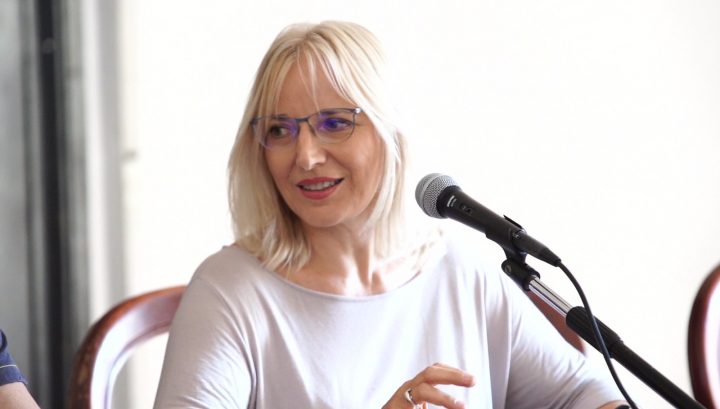Social and environmental justice, the fight against poverty, migration, eco-femminism, disarmament and climate emergency. We discuss these and other things with Daniela Padoan, writer, journalist and activist who is standing for the European parliament elections with ‘La Sinistra – GUE/NGL European Left’ in North-Eastern Italy.
What made you decide to stand for MEP?
The awareness of how important it is in this moment to maintain a strong Italian presence in the European Left, a deep commitment on topics such as migration, climate, the protection of labour and welfare and the democratisation of the European Union. As we face the advance of authoritarian and xenophobic forces, we need an alliance between the forces of the left in various countries. On a personal and deeper level, what drives me to act is the need to rebel against the humiliation and violence felt by every living being, animals included. The oppression of those who cannot defend themselves – migrants tortured in Libya, but also the elderly beaten up by a group of bullies, helpless patients abandoned in hospitals, the look in the eyes of a monkey undergoing testing – hurts me. To stop fighting against them would be the same as accepting this state of affairs – and in some way being responsible for it.
What are the issues that are closest to your heart and that you would like the raise in the European Parliament if you are elected?
First of all social and environmental justice, which are closely interconnected, as the encyclical Laudato Si has shown, challenging the capitalistic model, a ruthless model based on wars and the expropriation of resources, which treats people like waste and forces them to migrate, only to reject and condemn them to torture, abuse and death. Then, an eco-feminist vision which cares for the entirety of the planet, considers the earth and nature as a common home, following the practice of indigenous cultures and breaking with the violent extractive pattern of patriarchy, which exploits bodies, the earth and resources. Europe should finally have a Constitution and in this Constitution – following the example of what was done in Ecuador and Bolivia – the rights of nature and the commons should be added. As a founding member of the Observatory for Solidarity and the organisation “Diritti e Frontiere” (Rights and Borders), in the last few years I have been very active on the issue of migration, joining many other organisations in fighting against the criminalisation of solidarity with migrants. In this area Europe is carrying forward a criminal set of policies, merging an empty rhetoric on European values with unconscionable deals with countries like Libya and Turkey. It should instead promote humanitarian corridors, channels for legal entry, the reform of the Dublin agreement (voted by a majority in the Parliament and then blocked) and put into place a real search and rescue operation in the Mediterranean, enlisting the help of humanitarian NGOs, instead of hindering and demonising them. Another strong issue is the fight against poverty and the racial discrimination which is directed against the poor. Here there is much to be done, from the opposition to the fiscal compact (and its disastrous effects on social welfare), to policies in support of fundamental rights like health and housing. And then the commitment to disarmament, the decrease in military spending, signing up to the treaty for the ban of nuclear weapons and the ecological conversion of the weapons industry. All of these issues which are apparently distant from one another are in fact connected and require a common approach.
What can be done to establish networks and strengthen the link between civil society and elected representatives?
I am thinking about a virtual space, but also a real one, a sort of forum – yet to build – where elected representatives can be in continuous contact with the voters and civil society, give an account of what they are doing, receive requests, information and suggestions. A space that is instituted at a parliamentary level and is not just a simple consultation of organisations.
What do you think of the surge of movements fighting for the environment and against the climate emergency?
The climate emergency seems to me to be not only a central issue on the agenda today, but also a question that necessarily involves all the others, because the politics of migration, poverty, slavery, human rights, lifestyle, commons, are all necessarily connected to the environmental and climate crisis and represent specific articulations of the decision that are needed to step out of it. Not to do it would be like proposing an electoral programme from the Titanic that is about to sink.
Translation from Italian by Davide Schmid






